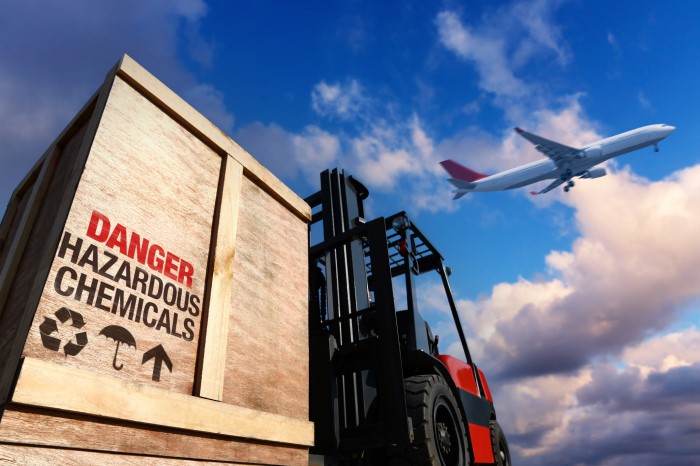Disposing of POP waste: what interior designers should know
Primary tabs
Some waste contains substances that don't break down in the environment and needs specific treatment. Learn about your responsibilities.

Waste created as part of a project can contain Persistent Organic Pollutants, known as POPs, and it is imperative that waste that contains POPs is managed correctly. ‘Put simply, POPs are a danger to human health and the environment,’ explains Richard Lear, branch manager of BIID Platinum Partner Clockwork Removals & Storage and Edwards Removals London.
‘These pollutants are chemical substances and do not break down in the environment. They can become widely spread geographically, and accumulate in the fatty tissue of wildlife and humans causing harm to health. Items containing POPs must not be put into landfill and, instead, correctly handled and disposed of in the approved manner.’
Presence of POPs in waste
Under the waste duty of care in England and Wales you must know if your waste material contains POPs. If it does, you must follow the procedures for managing waste containing POPs. In Northern Ireland, find out about POP disposal from the Department of Agriculture, Environment and Rural Affairs, and in Scotland, check the guidance from the Scottish Environment Protection Agency.
Upholstered domestic seating – for instance sofas and sofabeds, armchairs, kitchen and dining room chairs, stools and footstools, home office chairs, futons, bean bags, and floor and sofa cushions – may contain POPs. Waste electrical and electronic equipment (WEEE) can also contain POP waste. Other waste may contain POPs.
Legal requirements
The rules on POPs must be followed. ‘These changes in legislation are enforceable by law, following the UK agreeing, along with various other nations, to compliance at the Stockholm Convention in August 2022,’ says Richard. ‘The Environment Agency has already initiated its assessment of compliance across the sector from1 January 2023.’
The Stockholm Convention is a global treaty ‘to protect human health and the environment from chemicals that remain intact in the environment for long periods, become widely distributed geographically, accumulate in the fatty tissue of humans and wildlife, and have harmful impacts on human health or on the environment’. The treaty seeks to eliminate or reduce the releases of POPs into the environment.
Disposal of POPs waste
If your waste does contain POPs, it has to be managed correctly. Government guidance for England states that the person you send waste to must have the correct authorisation (and see above for links to information applying to other UK countries).
Waste can be sent to an authorised treatment plant where items, components or materials that contain POPs are separated from those that don’t. POPs waste mustn’t be mixed with other waste before or during separation. All the waste that contains POPs must be destroyed completely or irreversibly transformed and there are a number of methods by which this can be achieved. Which is suitable depends on the properties of the POP, the type of waste in which it is contained and the other chemicals or material present in the waste.
Be aware of the rules governing storage of POPs waste, too. It can only be repackaged or temporarily stored before it is destroyed, irreversibly transformed, or the POPs items, components or materials are separated, and an authorisation that allows this activity must be held.
Considering the reuse of upholstered domestic seating containing POPs? There are strict criteria by which you must abide and these are available from the Environment Agency.
Find a waste carrier
It is important to identify a business qualified to deal with project waste. ‘Even before the new POPs regulations came into force, every business who transports and disposes of waste for someone else must have a waste carriers licence,’ says Richard. ‘This is certainly a start for any designer looking for disposal services.
‘Equally, any diligent and ethical waste carrier will already know about the POPs regulations – at the very least their waste management company would have notified them of the changes: a clear sign your waste is being handled correctly. Unquestionably ask them how they intend, or even know, how to deal with waste that contains any POP. This will without a doubt tell you the competency of the business you’re speaking with.
’Certainly, ask any waste carrier if they have any other trade affiliations or quality standards,’ he continues. ‘Ours include the British Association of Removers (BAR), Commercial Moving Group and various standards, including the ISO 14001, which sets out the criteria for an environmental management system. We are proud of the service that we provide, helping to ensure our clients are safe in the knowledge we have their interests closest to our hearts.
Read BIID Resource Concerns about chemical Fire Retardants: What interior designers need to know to find out more.
Find out more about waste in Northern Ireland, Scotland and Wales.
Discover the BIID's progress with the 2021-2024 sustainability strategy
Don't miss the return of the BIIDs annual members event.
BIID President May Fawzy introduces the new three year strategic plan
The BIID Student Drawing Competition has now launched for 2024
Platinum Partner Iris Ceramica Group tells us about the sustainable solutions shaping the interior design industry
Learn more about the designers and projects that won BIID Interior Design Awards





